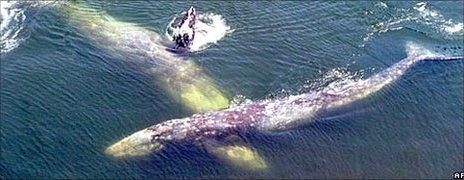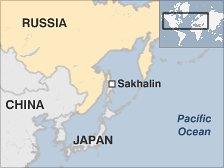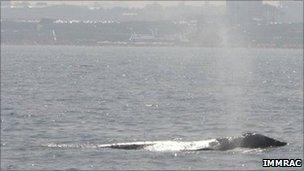Whales 'at risk' from oil surveys
- Published

Restrictions put on development are not enough, delegates urged
Oil and gas exploration in the Russian Far East continues to threaten whales, delegates at the International Whaling Commission (IWC) meeting have warned.
The critically endangered western population of gray whales spends its summer feeding around Sakhalin island.
Companies using seismic guns to find oil and gas in the area do take steps to reduce the impact; but scientists with the IWC say they need to do more.
Surprising new evidence has also emerged on the whales' migration.

The western population of gray (or grey) whales is one of the most threatened group of cetaceans on the planet, with only about 130 remaining, including an estimated 26 breeding females.
A small area on the Sakhalin coast is their only known feeding ground.
The IWC's scientific committee recommended that "appropriate monitoring and mitigation plans" should be implemented for oil and gas exploration in the area.
It also urged companies to work with independent scientists to "co-ordinate seismic surveys and other noise producing activities".
Making a noise
Seismic surveys entail the use of underwater sound at intensities that can force whales out of the area nearby, and may damage their hearing.
Following last year's IWC meeting, a group of 12 countries sent a letter to the Russian Ministry of Natural Resources and Environment urging the postponement of a major survey for at least a year.
However, the survey, for a local branch of the giant Rosneft corporation, went ahead.
Observers from non-governmental organisations report that surveying did not always stick within rules designed to minimise impacts on whales - for example, by detonating the seismic guns at night, when ships could not tell whether any whales were close by.
They also reported seeing fewer whales in the feeding area in days immediately following the surveys.
At this year's IWC meeting, the US and UK were among governments expressing concern about the situation and asking Russia to take tougher action.
And Belgium's delegate Alexandre de Lichtervelde said plans for expanding infrastructure at the site were premature.
"We are concerned that one of the companies (Sakhalin Energy) has announced a plan for a new oil and gas platform offshore," he told the meeting.
"That is happening while the full impact of events in 2010 have not been fully assessed."
Valentin Ilyashenko, leader of the Russian delegation here, said all oil and gas projects had to go through an impact assessment; but some effect on the whales could not be avoided.
"Human activities do influence the western gray whale; our task is to minimise the impact from human activities," he told BBC News.
"But we can't stop [human] progress, and we can't stop using oil."
Whale of a surprise
Last year, scientists attempted to put tags on 12 western gray whales in order to track their route to their breeding grounds, believed to be further south.

The gray whale that entered the Med last year and, scientists believe, probably died
It was thought that if their migration route could be mapped, other conservation measures could be put in place, such as keeping them out of fishing gear.
In the end, only one tag was placed before time ran out - on a male that scientists dubbed "Flex".
Some weeks later, to the researchers' complete surprise, Flex started heading not south but north and east, ending up on the other side of the Pacific on the US west coast.
This is the area occupied by the separate - and much bigger - eastern gray whale population. Genetic studies show that the two populations do not generally interbreed.
"It was completely the opposite of what any of us had suspected," said Greg Donovan, the IWC's head of science.
"So then we started to look at photos from the catalogue of our animals off Sakhalin island, and compare with those taken down the Pacific coast of the US and further south.
"And we've now ended up with 10 animals that have been seen on both sides."
What that means for our understanding of the western gray whales, or for their conservation, is as yet unclear. Other tagging studies are planned this year that might provide more information.
The gray whale that found its way into the Mediterranean Sea last year, however, probably sheds no light on the issue, said Mr Donovan - it probably just got lost.
- Published10 July 2011
- Published24 June 2010